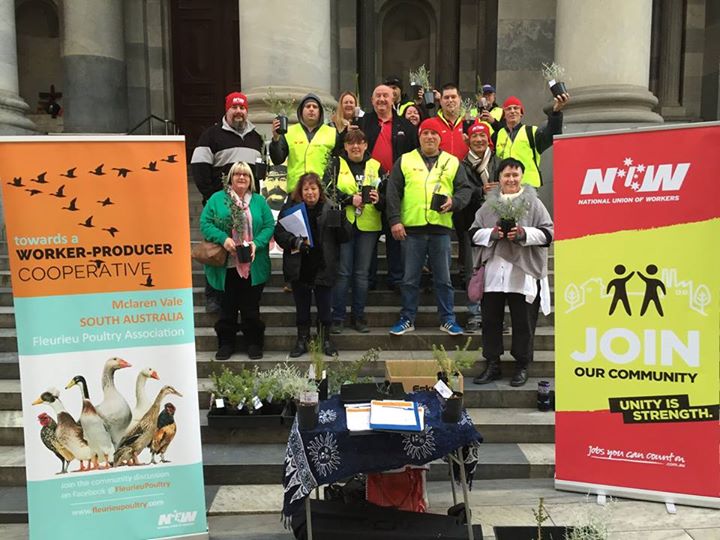Home » Enterprise » Cooperatives » Fleurieu Poultry: Getting the Ducks Lined Up on Relocalization

The Fleurieu Poultry Association is a co-operative that seeks to reopen a turkey processing plant at McLaren Vale, South Australia, and transform it into a worker-producer co-operative, owned and operated by employees. Share Adelaide interviewed Project Officer Rick Duke about this initiative.
Tell us about what you’re working on right now?
We are currently working to establish a community cooperative in a closed poultry processing plant south of Adelaide. When the factory was closed in December 2014, 79 people directly lost jobs, with flow on effects with abandoned contracts with suppliers, etc.
The state government has provided great support in funding a
feasibility study to the tune of $70,000. This was undertaken by a consultancy group and came back with promising results, showing there was a need for a poultry processing plant in the area, with widespread support from the local community and beyond.
Our current tasks are centred around finding funding for our project – we are talking with the state government, private investors and other more traditional lenders to raise the money needed to get us started. Buying the factory is critical.
How will your project benefit others?
As well as the potential to create around 50 ethical, sustainable jobs at the factory, we envisage 100 – 200 jobs being created through flow on effects such as farmers' poultry operations and the re-establishment of contracts to suppliers.
We are in contact with numerous beef farmers who want to run poultry on their properties for the benefits it will give their land – running poultry obviously gives them another income stream, but it also helps fertilize their land, reduce disease and keep weeds at bay among other advantages. So local primary producers will benefit.
Also, local chefs and butchers are currently able to source local beef, lamb, goat and pork, but not a lot of local poultry due to the current distance needed to process birds. There are some farmers who process their own birds, but they would rather not, and would increase their poultry operation if our factory got up and running.
The local community would benefit through the funding of local projects – for example if we gave 20% of our profit back to the local community, at the anticipated capacity we would like to reach where we profit $1 million, that is $200,000 going to local projects each year – that is also money that doesn’t have to come from local government or councils, and hence it frees money up for other projects.
What challenges are you facing in progressing your project?
Without doubt funding is the biggest issue – as a worker-producer cooperative with no security/assets, finding the money has been near impossible. We have private investors that have said they will come on board once we own the factory, but getting that funding is problematic.
So money is the key and we always knew this was going to be the hard part. With no security we are a big risk no matter how good the business plan is. We believe a $2 million loan from the government would be of great advantage to us. This would allow us to buy the factory and have a small amount of working capital behind us. With this, we are very confident that private investors would come on board, and that we could access other grants down the track that would see us a viable operation.
Initially, we were told that if the business plan came back positive, that there was a cooperative loan scheme that we could access to help get ourselves established. When it came time to look at this scheme however, we realized we didn’t qualify for it, and hence we are now struggling. We accept some of the blame for this as it really was our only hope, so we put our eggs in that one basket at the time.
Early on in the project, another challenge we faced was the lack of belief from the workers that a cooperative could be set up and could work.
Without the union’s involvement, we may never have made contact with some of our supporters – so that is a definite challenge for other cooperatives moving forward.
Luckily we have been able to establish some great contacts throughout this project. However, I can imagine there will be times when someone has a great idea for a cooperative, but cannot find the resources they need to help drive it forward. A lot of the time, the contacts you make put you onto other contacts, who put you onto even another contact, and that person is the one who is able to help you. We have been very fortunate that the
National Union of Workers (NUW) was able to bring together a whole army of contacts with it, or I fear we would have a much different story at this stage.
What would success look like for your project? Paint a picture with words!
Success for us would mean:
- Ethical, sustainable employment directly for around 50 people
- $8 million of economic activity every year in the local regions
- Re-establishment of contracts with suppliers of good and services that were lost when the factory shut down
- A project that paves the way for other cooperative hopefuls such as The Original Town Hall in getting up and running
- A whole new revenue stream for local farmers, and a whole new market of quality local poultry that is currently not readily available
- A business model that produces locally, processes locally, sells locally and keeps profits in the local area
- Organisations such as sporting clubs would have access to money to fund projects that they would otherwise be trying to get from council or government, but would instead be able to access through us.
What three things do you most need right now?
Right at this point in time we really need to buy the factory. Not having the factory would not necessarily be the end of us, but it would mean we could only start up and probably stay as a small scale operation with only a handful of employees.
It is rather embarrassing that at present I am talking to financial institutions, telling them our story and the outlook of the business plan, and asking them to lend us a substantial amount of money when we have no assets ourselves. Therefore, the money can only come from someone prepared to take a risk.
Money is also vital in helping support the role of a project officer. Without someone dedicated to this role in an official capacity, the general feeling among the team is that we wouldn’t have gotten this far. Having been lucky enough to have found some funding for this role has been crucial to its longevity.
We still have some lines of communication open with various lending organisations so we shall keep pushing forward.
I say this with the qualifying statement that we have respect from most people. I just believe there are various levels of it. What we do have absolutely, is respect for what it is we are trying to achieve – 50 direct ethical, sustainable jobs created with community spirit at the heart of the operation.
Where we lack respect is in relation to our ability to carry a project of this nature forward. Given we are mostly ex-workers and people with a general lack of expertise in this area, it is understandable that people doubt what we believe is possible. But this undermines a key point – that is that we have fully understood from the start our own limitations. We have known from the start we could not do it on our own.
This is why the National Union of Workers (NUW) was able to find someone like Dr Tony Webb who has extensive experience in cooperatives throughout the UK, and more recently in Victoria where he helped the
Goulburn Valley Food Coop set up in the aftermath of the Heinz factory closure in the area.
It is why we have gathered advice from multiple sources where possible, why we have gone to other cooperatives for help and support, and why we chose a professional consultancy group to undertake the feasibility study rather than do it ourselves.
The last point on respect and the doubters, is simply to say that most people, myself included, never thought we would get this far.
Already, we have shown that sometimes the impossible is possible.
With the two points mentioned above, they can only be brought together by someone who wants to take a risk, be it government, private investors or a corporate lender – we need someone to look at our feasibility study and simply say they are willing to take a risk. We acknowledge, that as with any business plan of this size, of course there is risk. We would lose all credibility if we did not acknowledge that.
An
announcement has just been made that $73 million is being put into the manufacturing industry in this state to create 430 jobs. This is great news indeed. With this level of funding, that is nearly $170,000 going toward creating each job. Money well spent.
We can provide similar value for money. For example, if the government loaned us the full $5 million we needed to get ourselves established over a five year period, at the end of that period we would be very confident of having around 50 direct jobs, so that is $100,000 invested for each job created. However we have not yet been able to persuade the government to take a risk and lend us just $2 million, which could well be a greater risk as we then have to find the rest of the money.
Obviously these three components are all directly related. It can also be said that these are probably three of the key components throughout the whole project.
##
If you want to learn more or help, contact Rick
here.
SUBSCRIBE
Subscribe to our newsletter for the latest sharing news:
*Required field. We promise not to spam you. You can unsubscribe at any time.









